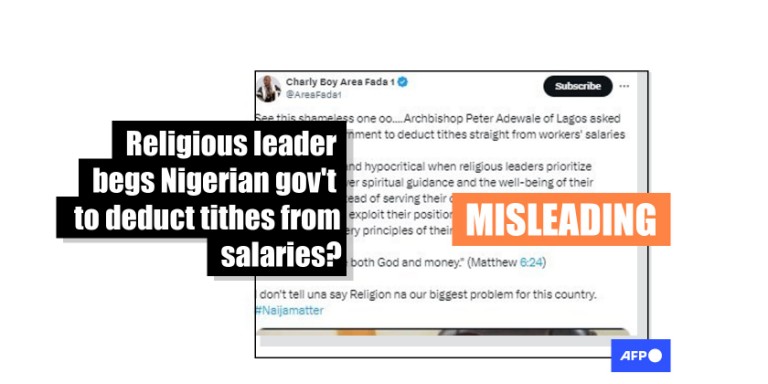
Nigerian archbishop did not ask government to deduct tithes from workers’ salaries
- This article is more than one year old.
- Published on July 18, 2024 at 16:37
- 3 min read
- By Samad UTHMAN, AFP Nigeria
The post, published on X on July 2, 2024, reads in part: “See this shameless one oo....Archbishop Peter Adewale of Lagos asked the Nigerian government to deduct tithes straight from workers’ salaries in June 2024. It’s indeed ironic and hypocritical when religious leaders prioritize material wealth over spiritual guidance and the well-being of their congregation (sic).”

Reposted more than 400 times, the post features a screenshot from an article by the Nigerian newspaper Punch. It includes an image of a man in black robes wearing a crucifix, and the headline reads: “Deduct tithes straight from workers’ salaries, Archbishop begs govt.”
The claim was shared by Nigerian singer Charles Chukwuemeka Oputa, popularly known as “Charly Boy”. AFP Fact Check has previously debunked claims he has shared (here, here and here).
Most of the commenters appeared to believe his latest claim.
“A man like Peter Adewale is as insensitive as [President Bola] Tinubu and his gangs. He, therefore, needs to be ignored no matter what title he goes by,” wrote one user. Another asked: “Does these pastors care if their congregations eat at all, order than milking them (sic)?”
However, the claim that Nigeria’s Lagos Archbishop Peter Adewale begged the government to deduct tithes from worker’s earnings is misleading.
Ugandan archbishop
AFP Fact Check conducted a search using the keywords in the Punch headline.
This led us to an October 2018 news article published by Punch with the same headline and image (archived here).
However, the article told a somewhat different story: it reported that the plea for taking tithes directly from workers’ salaries was made by a religious leader in Uganda, not Nigeria.
The report explained that the Archbishop of Kampala, Cyprian Kizito Lwanga, shared this idea during a Sunday mass.
“Whenever we ask for tithe, everyone gives only what they have at that time. But the Bible says a tenth of whatever you earn belongs to the church. Give me your support as I front this proposal because it is good for us. Aren’t you tired of putting money in the baskets all the time?” Lwanga was quoted as saying.
Before he died in April 2021, Lwanga said his sermon had been misunderstood (archived here and here).
“When I talked about involving government, I did not mean central government introducing a tax and collecting it under its institutes like URA (Uganda Revenue Authority), but I was referring to all those in positions of governance who are in charge of paying people's salaries to assist those who would like to support the church, have their tithe deducted from their salaries and forwarded to the church,” he was quoted as saying.
AFP Fact Check could not reach Adewale for a comment. However, online searches revealed there were no media reports attributing the comments in the claims to Adewale, who was installed as Catholic archbishop in Lagos on August 4, 2012 (archived here).
Tithing in Nigeria
In Nigeria, tithing is a common church practice that involves individuals giving a portion of their income, traditionally 10 percent, to their place of worship or religious institution.
The controversy around tithes in Nigeria has stemmed from certain popular pastors who in recent years have preached about dire consequences for those who fail to pay up.
For instance, in April 2018, the leader of the Redeemed Christian Church of God (RCCG), Enoch Adeboye, said that “anyone who is not paying his tithe is not going to heaven” (archived here).
In February 2022, Pastor David Ibiyeomie of the Salvation Ministry reportedly likened the failure to remit tithes to a crime.
“You pay, it’s only in Nigeria you don’t pay tax and they can leave you. In the Western world, it is a big criminal offence. If you don’t pay tithe, you are a criminal, your offence is punishable. The tithe is simply one-tenth of your income, 10 percent of your income goes to God,” Ibiyeomie was quoted as saying by local news publisher Sahara Reporters (archived here).
However, the debate over tithing has grown in Nigeria in recent years owing to several factors, including economic hardships, theological arguments about whether tithing should be compulsory in modern Christianity, and the lavish lifestyles of some church leaders (archived here).
Copyright © AFP 2017-2026. Any commercial use of this content requires a subscription. Click here to find out more.
Is there content that you would like AFP to fact-check? Get in touch.
Contact us
